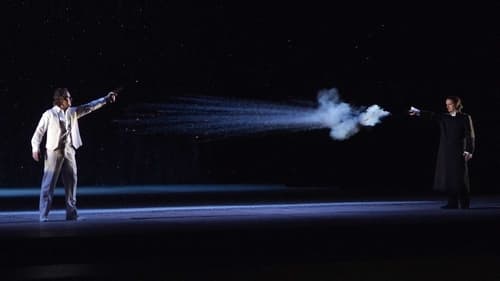
Amelfa
Lying in bed, Tsar Dodon dreams of retirement. The problem is, people keep invading his country. His astrologer offers him a golden cockerel with magical powers, a weather vane which indicates from which direction danger will come. In his case, it will be from the East in the shape of a charming oriental princess determined to conquer his kingdom.

Amelfa
Pushkin folk tale as comedic opera whose sultry elements expand an Oriental influence. Korsakov portrays the story of Tsar Nicholas II, punished for his cowardice and despotism, using satire to condemn Russia's autocratic ruler.

Filippyevna, Tatiana's nurse
Live performance from the Komische Oper Berlin, February 15 2016.

Erste Norn
Götterdämmerung, the final instalment of Wagner’s Ring of the Nibelung, is a story of human passions. Two essentially benevolent creatures, involved with and possibly doomed by their traffic with the gods, find treachery and evil in the world of the humans, and are ruined by the dark side of humanity. Iréne Theorin, acclaimed worldwide for her portrayal of Wagner’s heroines, stars as Brünnhilde opposite Lance Ryan, who continues his radiant portrayal of the tragic hero Siegfried. The strong cast also includes Mikhail Petrenko as the dark antagonist Hagen and Johannes Martin Kränzle, who once again shines as his father Alberich. Waltraud Meier has a memorable appearance as Brünnhilde’s sister Waltraute. With this 2013 recording of Götterdämmerung, the musically and visually compelling Scala Ring Cycle by Daniel Barenboim and Guy Cassiers was completed and proved to be one of the highlights of the Richard Wagner bicentenary.

Filipyevna
In Trelinski's timeless production he leads a superb, first-class young cast headed by Artur Ruzinski as Onegin and Kristīne Opolais as Tatyana. Mariusz Trelinski, Polish filmmaker and theater director, has created a series of dream-like, surrealist tableaux of great suggestive beauty.

Alkonost
Opera lies at the heart of Rimsky-Korsakov's colourful idiom, but performances are few and far between; this realisation of his penultimate and grandest stage work is a very rare and special experience. Kitezh is known as "the Russian Parsifal", which encapsulates its mystical flavour and steady unfolding of a legend of redemption




